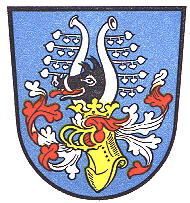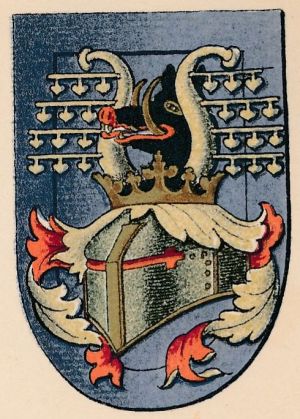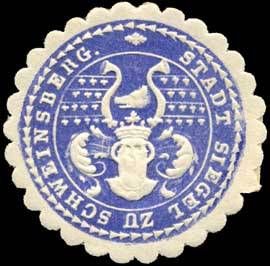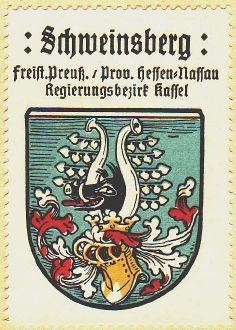Schweinsberg: Difference between revisions
Jump to navigation
Jump to search
Knorrepoes (talk | contribs) m (Text replacement - "{| class="wikitable"↵|+Official blazon↵|-↵|'''German'''↵| ↵|-↵|'''English''' ↵| {{blazon wanted}}↵|}" to "{| class="wikitable" |+Official blazon |- |'''German''' | blazon wanted |- |'''English''' | blazon wanted |}") |
Knorrepoes (talk | contribs) m (Text replacement - "{{de1}}" to "{{de}}") |
||
| Line 32: | Line 32: | ||
{{ | {{de}} | ||
{{media1}} | {{media1}} | ||
Revision as of 10:55, 25 July 2023
SCHWEINSBERG
State : Hessen
District (Kreis) : Marburg-Biedenkopf
Incorporated into : 1971 Stadtallendorf
| German | blazon wanted |
| English | blazon wanted |
Origin/meaning
Schweinsberg received city rights in 1332, but the city never used an own seal or arms until 1818. The new seal showed the present arms, which combine the crest of the Princes of Hessen with a canting swine's head. The city was a possession of Hessen since the early 16th century. As several other towns also used the crest in their arms (Kirchhain, Kirtorf), the swine's head was added to distinguish the arms.
| The arms in an 1884 book |
Seal from around 1900 |
| The arms by Hupp in the Kaffee Hag albums +/- 1925 |
Literature: Stadler, 1964-1971, 8 volumes.
This page is part of the German heraldry portal Deutsche Wappensammlung |
Heraldry of the World |
|
German heraldry:
|
Selected collector's items from Germany:
|





